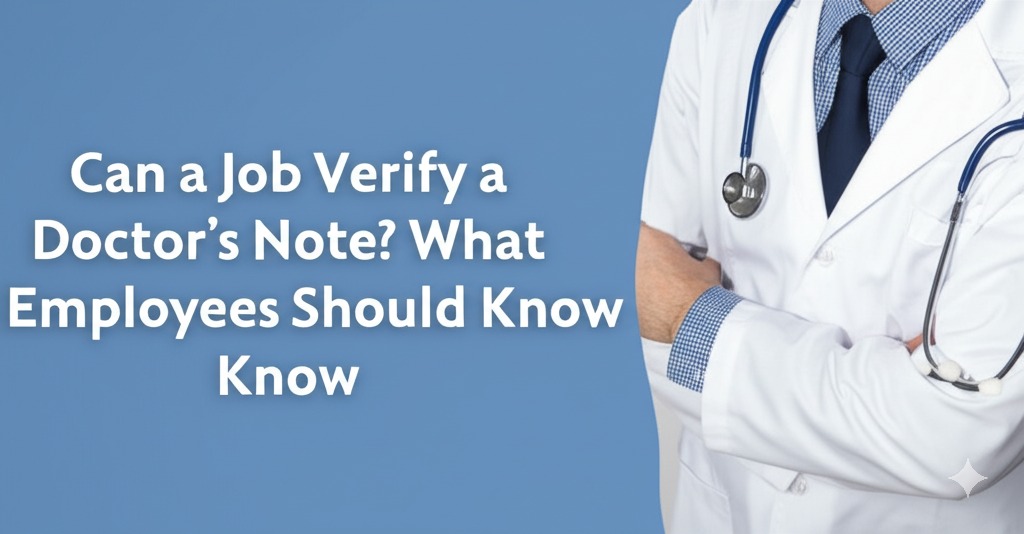
When you call in sick or request medical leave from work, submitting a doctor’s note might seem like the end of the story. But what if your employer questions it? Can a job actually verify a doctor’s note? It’s a question many workers have, especially when dealing with sensitive health issues and privacy concerns.
In this article, we’ll break down whether employers can verify medical notes, what your rights are under privacy laws, and how to handle situations where your note is challenged. Whether you’re an employee or an HR professional, understanding the rules around medical documentation is crucial.
Can Employers Legally Verify a Doctor’s Note?
Yes—But Within Limits
Employers can verify that a doctor’s note is real, but they cannot ask about your diagnosis or detailed medical history. That’s protected under privacy laws like the Health Insurance Portability and Accountability Act (HIPAA) and the Americans with Disabilities Act (ADA).
Here’s what an employer can do:
- Contact the doctor’s office to confirm the note is legitimate.
- Ask for clarification on return-to-work dates or any work restrictions.
Here’s what an employer cannot do:
- Ask your doctor why you were out.
- Request medical records without your consent.
- Pressure you into revealing personal health details.
What Does “Verifying” a Doctor’s Note Mean?
Verification typically involves confirming:
- That the doctor’s office issued the note.
- The dates of treatment or absence.
- That the note was signed by a licensed medical provider.
This process does not involve discussing your condition or anything beyond the scope of confirming authenticity.
Employee Rights and Privacy Protections
HIPAA and Medical Privacy
HIPAA restricts how medical information is shared. Employers are not covered entities under HIPAA, but your healthcare provider is. That means:
- Your doctor cannot release your medical information without your written permission.
- Employers can’t call your doctor to ask about your health—only to verify the legitimacy of the note.
ADA and Reasonable Accommodations
Under the ADA, if you have a condition that qualifies as a disability, you’re entitled to reasonable accommodations at work. Employers may request documentation to support an accommodation, but even then:
- They can only ask for information relevant to the accommodation, not your full medical history.
When Employers Might Verify a Doctor’s Note
While many workplaces accept medical notes at face value, verification may happen in situations such as:
- Repeated absences or suspected abuse of sick leave.
- A vague or unclear note.
- Conflicting information about your availability or condition.
In these cases, HR may contact the provider’s office only to confirm authenticity, not probe into private health matters.
Can You Get in Trouble for a Fake Doctor’s Note?
Yes—submitting a fake doctor’s note can lead to serious consequences, including:
- Disciplinary action or termination.
- Loss of trust between you and your employer.
- In rare cases, legal consequences for forgery.
Employers who suspect a note is fake may verify it—and if fraud is discovered, you could lose your job.
Tips for Employees When Submitting a Doctor’s Note
To protect yourself and maintain trust with your employer, follow these best practices:
- ✅ Provide notes from a licensed provider.
- ✅ Submit notes promptly, ideally the same day or within 24 hours of returning.
- ✅ Keep the note clear and professional—avoid handwritten or hard-to-read notes.
- ✅ Be honest about your condition; don’t exaggerate or falsify.
- ✅ Maintain open communication with HR, especially if you expect prolonged leave.
What If Your Employer Pushes Too Far?
If you feel your employer is crossing a line, you have options:
- Speak to HR or a supervisor about your privacy rights.
- Contact a labor attorney if you believe your rights are being violated.
- File a complaint with the Equal Employment Opportunity Commission (EEOC) if there’s a potential ADA violation.
Remember: You’re not required to share your full diagnosis, and you can refuse to answer overly intrusive questions.
Conclusion: Know Your Rights and Responsibilities
So, can a job verify a doctor’s note? Yes—but only to a limited extent. Employers can confirm that a note is real, but they can’t dive into your medical records or ask for personal health information without your consent.
Understanding the balance between employer needs and employee rights is key. As an employee, be honest, prompt, and professional with your medical documentation. As an employer, respect privacy while ensuring workplace policies are upheld.
Have concerns about medical leave or workplace privacy? Don’t hesitate to consult a labor rights expert or HR professional to get the clarity you need.

Andre Cuevas provides career insights, job search strategies, and professional advice to help individuals navigate the job market and achieve their career goals.






